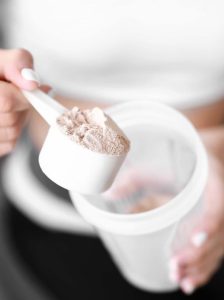
Athletes and fitness enthusiasts commonly use protein powder to enhance muscle growth and physical performance. However, its utility extends beyond the realm of sports and physical activities. Protein powder serves multiple purposes, aiding individuals in meeting their daily protein needs, managing weight, or recovering from injuries or surgeries.
A prevalent dietary supplement for augmenting protein intake is protein powder, versatile for various health and fitness goals. It can be derived from animal or plant sources. Opting for a high-quality protein powder can contribute to a more balanced diet and improved health. Nonetheless, it’s vital to recognize that while protein powder supplements can fine-tune one’s diet, they cannot substitute the essential nutrients provided by whole foods.
Selecting the right type of protein powder involves understanding its advantages and disadvantages. Athletes and fitness enthusiasts frequently leverage protein powder not only for muscle building but also to meet protein requirements, manage weight, or aid in recovery. Protein powders derived from both animal and plant sources cater to diverse dietary preferences and restrictions.
*Animal Protein: Whey protein, constituting 20% of cow’s milk proteins and being water-soluble, stands as one of the most popular types of protein powder. It boasts abundant leucine, a crucial amino acid essential for muscle repair, and is swiftly absorbed. Other animal-based protein powders include egg, collagen, and casein, the latter forming 80% of cow’s milk protein.
* Plant Protein: Plant-based protein powders have gained popularity due to the rising interest in plant-centric diets. Various plant-based protein supplements like pea, hemp, pumpkin seed, soy, algae, and rice protein powders cater to those allergic to dairy, offering a diverse range of options.
Benefits of Protein Powder
1. Convenience: Protein powder supplements assist in meeting protein goals, especially in scenarios where obtaining sufficient protein through regular diet becomes challenging due to time constraints or reduced appetite.
2. Cost-Effective: They offer an affordable alternative for athletes and individuals aiming to fulfill their protein requirements compared to solely relying on high-protein whole foods.
3. Nutrient Density: Providing a concentrated amount of protein without added carbohydrates or fats, protein powders aid in controlling overall calorie intake while boosting protein consumption.
4. Muscle Growth and Recovery: Crucial for muscle repair and growth, protein powders, particularly those containing high-quality sources like whey or casein, aid in muscle protein synthesis, enhancing recovery post-exercise.
Drawbacks of Protein Powder
1. False Sense of Healthy Eating: Overreliance on processed protein powder might mislead individuals into believing they’re consuming a healthy diet, whereas minimally processed whole foods offer superior quality proteins.
2. Incomplete Meal Replacement: Despite high protein content, protein powder lacks certain elements found in whole-food protein sources like fats and vitamins, making it an incomplete meal substitute.
3. Variability in Quality: Not all protein powders are created equal. Checking labels and understanding the product’s composition is crucial, as marketing materials for supplements can be misleading and omit crucial information.
In conclusion, protein powder serves as a versatile supplement aiding in various health and fitness goals. However, it’s essential to balance its benefits with potential drawbacks and prioritize a diet comprising whole, minimally processed foods for optimal nutrition. Understanding individual needs and consulting a healthcare professional can guide in choosing the most suitable protein powder supplement.








